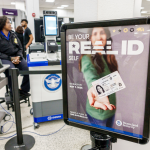More than 200,000 voting-eligible transgender Americans may find it difficult to cast a ballot in the upcoming midterm elections because of voter ID laws, according to a recent report from a think tank that researches sexual orientation, gender identity law and public policy.
The report, released last month by the Williams Institute at the University of California, Los Angeles School of Law, estimates these people could be challenged by poll workers or other election officials because their voter registration information does not match their ID or other documentation.
From that figure, more than 64,000 trans people could face additional barriers because they live in states with strict photo ID requirements that may require them to cast a provisional ballot to vote. Those votes might not count unless the voter can later provide acceptable information.
“As we think about election policies and the rules that we put around how and where people vote — and especially when the topic of voter ID comes up — I think it’s important to separate out the stated intent of these laws and what their actual impact is,” said Kathryn K. O’Neill, a policy analyst at the Williams Institute and one of the report’s authors.
The report highlights the ongoing challenges that trans people can face as they attempt to participate in daily life. The process for obtaining identification documents that reflect a person’s correct name and gender marker can vary by state, creating an uneven system.
Thirty-five states require voters to show a form of identification to vote. Some states (18) require a photo ID; other states (17) accept non-photo IDs. Some states allow voters to present other identification information, like a utility bill or a bank statement, if they don’t have ID to vote, and others require voters to cast a provisional ballot.
In 2021, Jey’nce Poindexter of Michigan reached out to an attorney about the cost of legally changing her name.
A community organizer, Poindexter, a transgender woman, had long wanted to ensure official paperwork matched her gender identity. Poindexter eventually wanted to buy property. She wanted to vote without facing questions about mismatched identity information. (Michigan requires a photo ID to vote, but the Williams Institute considers the state to have a non-strict law because it allows a voter without ID to sign an affidavit.)
But simply having updated identification paperwork was important to Poindexter.
“It may be trivial to someone else. But I pay my taxes. I pay my bills. I manage and run my household. I’m there for my family. So if all of these ways lead up to humanity, and to being a human being — I’m certainly having documentation and ID and personal documents align with my presentation,” she told The 19th. “That means the world to me.”
But the attorney that Poindexter contacted offered a steep estimate: $3,600 for a retainer, and more for any court appearances and filings.
“I just thought that was ridiculous,” she said.
Most states and the District of Columbia require voter registration to match a legal name; some states require proof of gender affirmation surgery to update the gender marker on a birth certificate. In others, a person may be required to publish an announcement in the newspaper to change their name — a practice that advocates worry can put a person at risk of physical harm or harassment.
Thirty percent of trans people reported verbal harassment when they show identification in general with a name or gender that does not match their gender presentation, according to an estimate by HeadCount, a nonpartisan organization that conducts voter registration drives.
The Williams Institute has tracked the potential impact of voter ID laws on trans people each election year since 2012. But its methodology for measuring impact has evolved, including how it categorizes states with different policies. It makes it difficult to compare the latest report to previous ones.
“The biggest change over time in this field has been data availability. It’s the constant issue,” O’Neill said. “It’s something that has been getting a lot better recently.”
Poindexter had already begun looking into the process for a legal name change in 2020, but the pandemic paused her efforts. After her experience with the attorney, she figured she could restart the process herself. Through her community, she was connected with someone from VoteRiders, a nonpartisan, nonprofit organization that helps people obtain identification to vote. An organizer with the group has more recently helped Poindexter with paperwork.
Poindexter, who plans to vote by absentee ballot this year, declined to share more specifics about her case, to reduce the likelihood of public harassment. But she expressed gratitude to VoteRiders and concern for others who may not know to get a second opinion on something like potential legal costs.
“I see how it would intimidate another young lady or young man or person, period,” she said.
Lauren Kunis, CEO and executive director of VoteRiders, said the group works primarily on voter ID education and voter ID assistance. This election cycle, they’re focused on eight states with voter ID laws or pending ID policy, or that they deem competitive: Arizona, Florida, Georgia, Michigan, Pennsylvania, North Carolina, Texas and Wisconsin.
Their voter ID assistance can include pro bono legal help to people who need to get a name change or update a gender marker to get identification. The group also pays for rides to and from identification-issuing offices.
“We want to make sure that any legal or bureaucratic or financial barrier that a voter might face in obtaining an acceptable ID is removed and they’re able to make their voices heard at the polls,” Kunis said.
That includes not just trans people but others who may face paperwork hurdles. The group believes voter ID laws have a disproportionate impact on women because many change their name when they marry. That means they can have conflicting name information on a driver’s license or voter registration.
“Seventy percent of women are estimated to change their names when they get married,” she said. “So they face a lot of challenges when the ID on their driver’s license that they present at the poll doesn’t match the name on their voter registration from when they were 18 years old.”
The Williams Institute report notes research that shows trans people of color, who are elderly, homeless or have lower incomes are less likely to have identification.
Still, efforts to measure the impact of voter ID laws on voter turnout have been mixed, in part because many studies have occurred before states enacted the strictest kind of identification requirements — often rules that require photo ID with few or no alternatives available. Not all voter identification rules are the same, and some do offer flexibility so that a voter may still be able to cast a ballot if they do not have identification.
Most importantly, there has not been close examination of the effect of voter ID laws on trans people. Kunis with VoteRiders said her staff of two dozen work around the country and talk with people about voter ID daily.
“What we know through the feedback that we get from the communities we serve is that these laws confuse voters, they intimidate them, and they deter them from casting a ballot,” she said. “That’s the kind of thing that’s hard to quantify.”








